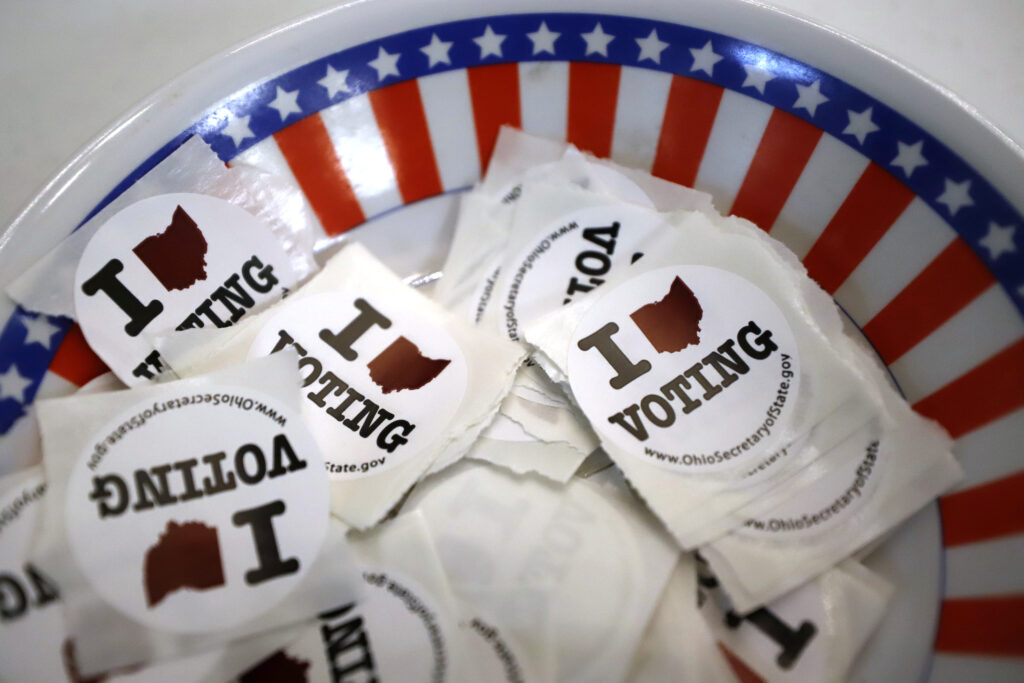After DOJ Threat, Ohio GOP Passes Law to End Mail Ballot Grace Periods

Republicans lawmakers in Ohio approved a sweeping anti-voting law Wednesday that includes disenfranchising voters whose ballots are delayed in the mail.
That provision was drawn up after the U.S. Department of Justice threatened to sue the state if it didn’t end its grace period for mail ballots.
Get updates straight to your inbox — for free
Join 350,000 readers who rely on our daily and weekly newsletters for the latest in voting, elections and democracy.
Senate Bill 293 (SB 293) was rushed through the Legislature with only one House hearing and now heads to Gov. Mike DeWine (R) for his signature.
In addition to dismantling Ohio’s four-day grace period for mail-in ballots, the measure imposes strict proof-of-citizenship requirements for people registering to vote, expands mass voter purges and creates mandatory criminal referrals for voters who cannot correct bureaucratic errors.
Republican sponsors framed the scrapping of the state’s mail-ballot grace period as a direct response to a September letter sent by the DOJ demanding Ohio change its election laws or face federal litigation.
That letter, signed by DOJ Civil Rights division leader Harmeet Dhillon, warned Attorney General Dave Yost (R) that “Ohio’s law directly conflicts with these federal statutes” and claimed that, under Trump’s executive order, states must “require that votes be cast and received by the election date. It threatened Ohio with “costly litigation” unless it changed its law.
“All ballots should be received by the time polls close on Election Day. The days of ballots arriving and being counted as many as 4 days after are in the past!,” state Sen. Majority Leader Theresa Gavarone (R) posted on social media, adding that she was “proud sponsor SB 293, which aligns Ohio with President Trump’s recent election integrity Executive Order.”
That March executive order — most of which was blocked by the courts. — directed the DOJ to aggressively enforce two federal statutes establishing the date of federal elections. Those laws set the day Americans cast their ballots but do not define when states must receive those ballots.
Despite decades of bipartisan support allowing states to accept ballots postmarked by Election Day, the DOJ argued Ohio’s policy violated federal law and threatened “costly litigation in federal court” if lawmakers failed to act quickly.
Courts — including the U.S. Supreme Court — have long held that Congress sets the date of the election, not the deadline for ballot receipt.
The Supreme Court is preparing to hear out of Mississippi that will test whether states can continue to count ballots that arrive after Election Day. Currently, sixteen states allow late-arriving ballots to be counted if they are postmarked by Election Day.
Still, Ohio Republicans moved quickly to appease Trump’s DOJ.
And SB 293 does far more than end Ohio’s grace period. It forces voters flagged by state databases to cast provisional ballots and requires them to appear in person within four days to correct records — or lose their registration. It orders monthly citizenship checks using BMV and federal immigration databases known to contain errors.
Anyone flagged as a potential non-citizen who fails to respond to state notices faces automatic referral to the attorney general for investigation and possible prosecution. It also tightens the rules for challenged voters at the polls, requiring naturalized citizens to show documentary proof of citizenship on the spot.
Democrats say the law will disenfranchise thousands of voters with no evidence of fraud.
“Senate Bill 293 is a deliberate attempt to silence voters by rigging the system with rushed, unnecessary barriers that make it harder for everyday Ohioans to cast a ballot. This isn’t about security; it’s about political control and protecting power,” state Sen. Minority Leader Dani Isaacsohn said in a statement Wednesday. “If Republicans truly believed their extremist agenda had public support, they wouldn’t be afraid of voter participation.”
These provisions will likely fall hardest on seniors, students, rural voters and naturalized citizens who already face disproportionate barriers to voting, with no evidence of fraud.
Furthermore, in the 2024 election, more Republicans than Democrats returned mail-in ballots that were counted under the grace period Ohio is now eliminating.
SB 293 now awaits the governor’s signature. If signed into law, nearly every aspect of voting by mail, voter registration and provisional ballot processing in Ohio will change. By pushing the bill through before the 2026 midterms, Republicans have guaranteed its impact will be felt immediately.